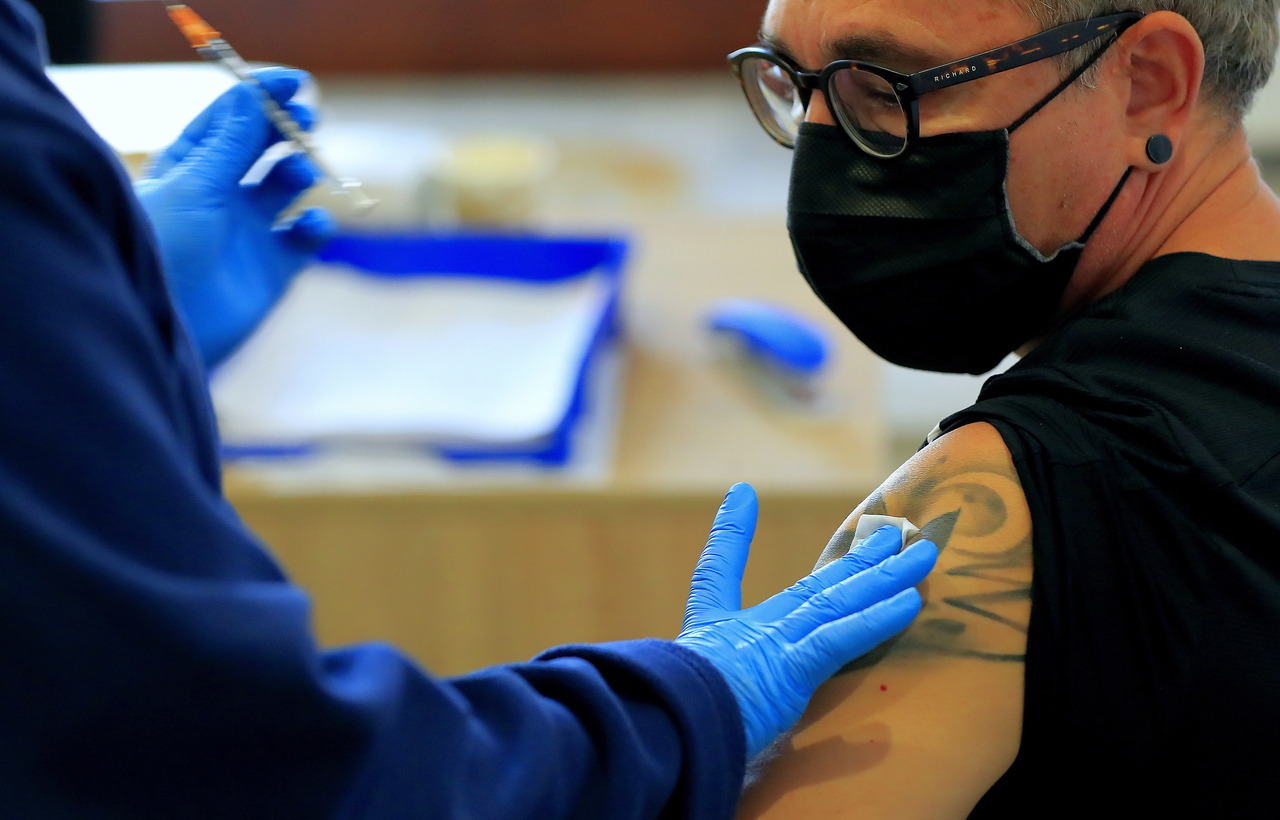Europe embraces booster vaccines to fight Covid-19's fourth wave
Sign up now: Get ST's newsletters delivered to your inbox

Some are already offering boosters to all adults, particularly in eastern Europe where overall vaccine uptake has been very low.
PHOTO: EPA-EFE
BRUSSELS (BLOOMBERG) - Europe is rolling out Covid-19 booster shots, hoping to protect the most vulnerable as coronavirus infections surge and threaten to cause another disastrous winter.
While the push is concentrated on the elderly and those with weakened immune systems, it could expand into a full-throated drive to give another dose to entire adult populations.
Governments are desperate to bring to an end the waves of outbreaks that keep emerging, and avoid the prospect of more restrictions and lockdowns. Boosters are the latest stage in their efforts after almost two years of battling, and mark the start of what may be annual inoculations as the world learns to live with the virus long term.
Italy is among the countries considering a widespread programme. Deputy health minister Pierpaolo Sileri said this week it's "likely that Italy will start giving booster doses to everybody from January."
German Health Minister Jens Spahn has already rolled up his sleeve again. The 41-year-old got a booster shot on Thursday (Oct 28) and said in a tweet there's enough for everyone. "Everyone who gets a booster, who discusses it with his doctor, is doing his bit to help us get through the winter safely," Spahn said on RBB Inforadio on Friday.
But reactions captured some of the confusion over boosters, with some saying they'd like to get one but can't convince their doctors.
Germany's vaccine authority has so far only called for boosters for those aged 70 and up, along with immunocompromised individuals, healthcare workers and people who previously got the single-dose Johnson & Johnson vaccine.
The European Medicines Agency has, in fact, already cleared booster shots for the Pfizer-BioNTech and Moderna vaccines for everyone 18 and up, provided at least six months has passed since the last shot. Decisions on who should receive the extra dose and when are up to individual governments.
While most countries are already giving boosters to the elderly and those deemed most at-risk, their definitions vary.
After initially targeting those 60 and up, Greece is now focusing on anyone older than 50. Health workers are only being given the shots in some countries so far.
Some are already offering boosters to all adults, particularly in eastern Europe where overall vaccine uptake has been very low.
Lithuania, where only 59 per cent of the population is fully inoculated, has dispensed with age restrictions altogether. So, too, has Romania, where only 31 per cent of people are fully vaccinated.
Israel offers an example of the promise of boosters, after a rollout of third doses this summer helped suppress a surge in new cases.
Dr Sharon Alroy-Preis, head of public health services at the country's Health Ministry, said projections at the time suggested hospitals would have been overwhelmed if the rise had gone unchecked. "We really saw an exponential rise in severe cases, and so we had to act quickly," she said of the booster campaign.
There's also evidence from recent studies, with Pfizer and BioNTech saying this month that a booster of their vaccine, given 11 months after the second dose, restored earlier levels of protection against symptomatic Covid.
Other parts of the world are embracing boosters, too. The US is giving them to those 65 and up as well as a range of people deemed at risk, including teachers, grocery store workers and first responders. South Africa will offer them to health workers from next month.
One fault line in all of this is whether it's ethical to use tens of millions of doses on people who've already gotten some protection against Covid when many countries, such as in Africa, have only fully vaccinated less than 5 per cent of their populations.
"There is still, from a global equity point of view, a strong argument for more actively sharing doses," Dr Andrew Pollard, professor of paediatric infection and immunity at the University of Oxford, told UK lawmakers. "The issue with supply is if the whole world decides to start boosting now, then those countries that were behind will be left even further behind."
In the UK, more than 7 million people have received a booster shot. Explaining its recommendation this month, a government advisory panel said it's taking a "precautionary position," to "maintain a high level of protection in vulnerable adults throughout winter."
Then there's the question of whether the science sufficiently justifies widespread boosting now, particularly for younger people with healthy immune systems. Others are convinced, though, that opening the spigots on boosters is right in the face of this latest rise in Covid infections and hospitalisations.
Doctors and nurses are already exhausted, said Dr Leif Erik Sander, an infectious disease and vaccine research expert at Berlin's Charite hospital.
"If we gain three, four months with very high immunity, that's exactly the time we need to curb transmission and the surge," he said. "We should have probably done this a little earlier, but now is basically the time."


